GOP Candidates Snub Black Debate
Robert Cox, president of the Media Bloggers Association, has an editorial in today’s Washington Examiner excoriating the top Republicans for skipping the PBS debates with Tavis Smiley on issues of special importance to “people of color”.
This is not only a strategic mistake for these campaigns but also a major embarrassment for the Republican Party.
How can voters take seriously a candidate asking for their support to be leader of the free world when that same candidate is unwilling to take questions from black journalists, in front of a predominantly black audience?
The absence of former New York City Mayor Rudy Giuliani, former Massachusetts Gov. Mitt Romney, Sen. John McCain of Arizona and former Tennessee Sen. Fred Thompson from what has been, so far, the only nationally televised debate to focus solely on topics of interest of black Americans sends a very clear message that not only is the Republican Party not interested in courting the “black vote” but is not even willing to engage on issues of importance to African-Americans.
This goes beyond any one campaign. It is nothing less than a disgrace for the entire country. Is it any wonder that when Kanye West blurts out “President Bush hates black people” on national television that many black Americans nod their heads in agreement?
Newt Gingrich agrees:
“I’m puzzled by their decision. I can’t speak for them. I think it’s a mistake. I wish they would change their minds — they still have a few days — and I wish they would in fact go to the debate Thursday night,” said Gingrich, who is considering entering the race for the GOP nomination.
The top four candidates in the GOP race — former New York Mayor Rudy Giuliani, former Tennessee Sen. Fred Thompson, Arizona Sen. John McCain and former Massachusetts Gov. Mitt Romney — all declined to participate in the forum citing scheduling conflicts and fundraising pressures. Former Arkansas Gov. Mike Huckabee and other longshot GOP candidates who have agreed to participate “deserve some praise for showing up and for carrying the message,” Gingrich said.
“I think Republicans could have, if they had the nerve to do it, a tremendous message,” Gingrich said. “There are a lot of good cases to be made that the African-American community has been hurt more by the failures of government than any other community.”
Like President Bush routinely snubbing the NAACP convention, this action undoubtedly reinforces the preexisting stereotypes about the Republican Party. On the other hand, it’s far from clear that showing up at these debates will do much to change those preconceptions. With the black leadership fully in the pocket of the Democratic Party and willing to run vicious smear attacks against Republican candidates, it’s not hard to see why the GOP frontrunners made the cost-benefit calculation they did.
That said, there’s something to the notion of at least making the effort to reach out. My guess is that doing so would have essentially no impact on the percentage of blacks voters choosing the Republican candidate next November. It might, though, help at the margins of dispelling the silly notion that Republicans don’t care about black people. Taking the opportunity to address these concerns head on, emphasizing that, contrary to John Edwards’ sales pitch, we’re all part of one America couldn’t hurt.
Regardless, citing “scheduling conflicts” is a rather lame way of excusing these snubs. The Democratic candidates all managed to fit it into their schedule with far less advanced notice; indeed, this date was selected after agreement of all the major Republican candidates (except perhaps Thompson, who wasn’t officially in the race at the time). It would have been far better to take the stand that they’re only going to debate American issues, not “hypenated American” issues. Simply rejecting the whole notion of segmenting the debates as if there are presidents of Gay America or Black America or White America would have been a far more courageous position — and one consistent with Republican principles.

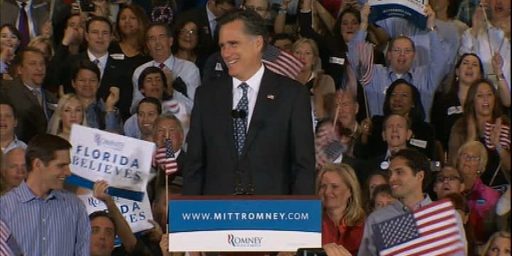
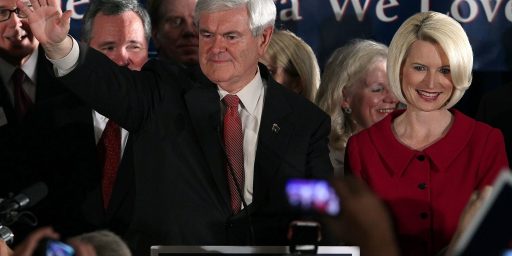
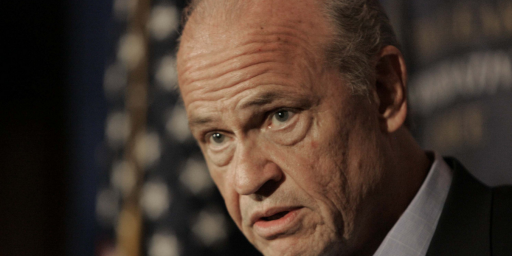
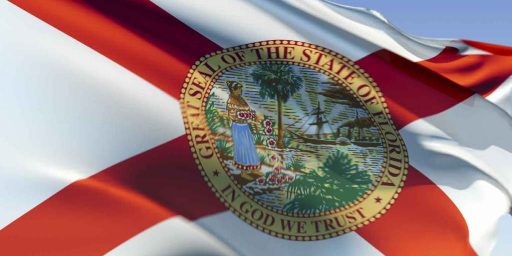
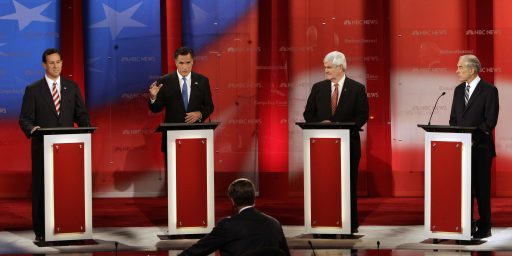
Ah, he had me up until he quoted Kanye West.
Seriously though, even if you are going to write off the black vote as lost, doesn’t mean burning that bridge won’t also cost you other votes. Most white folks don’t think to highly of racists, so getting labeled the anti-black party is likely to cost you non-black votes as well.
Besides, it’s not like any of the major GOP candidates don’t care about issues important to African Americans, they just feel that their solutions to those problems are better than the Democratic party’s solutions. The debates would be as good a forum as any to make their.
The only explanation I saw was some consultant’s fretting that the candidates would be booed.
Who knows, they might’ve been as astonished as Bill O’Reilly at Sylvia’s.
But & moreover, SO WHAT? Anyone who wants to be President of the U.S. had best be able to handle a little booing, and even to have a pretty good chance of getting an audience on his side.
There’s probably nothing I despise more about George W. Bush than his personal cowardice in avoiding any audience that’s not either friendly (pre-screened Repubs) or captive (active-duty military). What better indication of his unfitness.
This will be perceived as the same old Southern Strategy. The question is: will it alienate more blacks and/or liberal white votes than the number of conservative white votes that it accrues. I’m not convinced that any, much less all, of the GOP candidates are intentionally engaging in racist politics — but I’m very closely watching to see whether any of them campaign in Philadelphia, MS or at Bob Jones University.
Portraying the party of the Southern Strategy as just unfairly tarred as “not caring about black people” is why it’s very difficult to call you anything but a partisan hack.
Well, if one looks at GW Bush specifically, I don’t think he avoids communicating his message to blacks but I think he correctly perceives what type of reception he will get from the NAACP vs. the Urban League so why waste his breath on the former. But as far as GOP candidates go (since Bush is soon history), I agree. I think they need to suck it up and get their message to black voters in person irrespective of the reception the media will portray. I don’t think the GOP message resonates with inner city blacks at all and never will so I kind of understand why GOP candidates say why bother. Most inner city blacks have struggled under Democratic mayors forever. Like in Philly, it’s virtually a Pavlovian response to vote that party line. So I believe that sector of the black population has basically lost any clout due to its predictable voting behavior. But with middle class and upwardly mobile blacks I think it is very important for the GOP to listen and directly compete with the Democratic agenda.
The term “people of color” is clearly devisive and evidences a tinge of racism.
The political left is the only group that benefits by keeping racism alive in this country and the cowardly political right has refused to face this obvious truth head-on.
Kevin Drum passes along a reminder of where people got these wild-eyed notions of the GOP from. (Hint – rhymes with “Fee Batwater.”)
Mentioned it here and here.